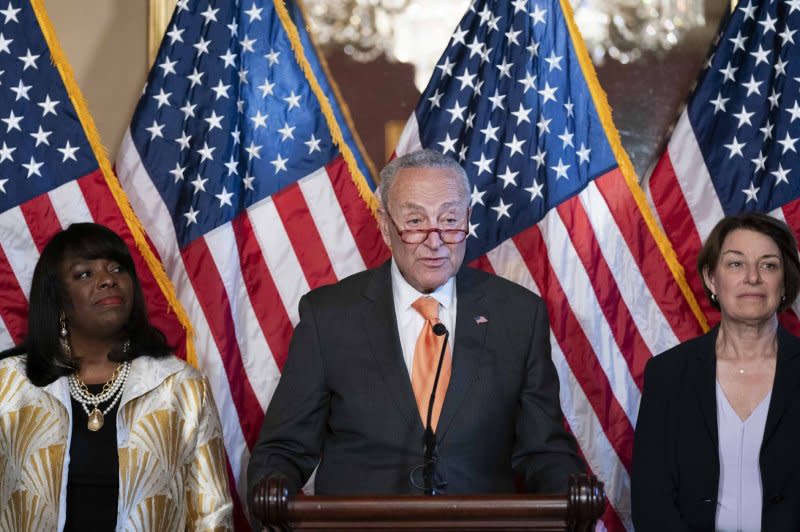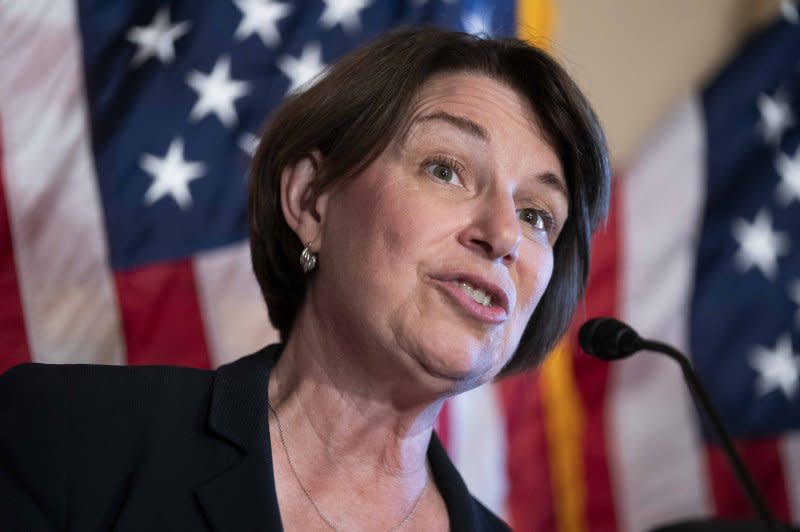House, Senate Democrats reintroduce Freedom to Vote Act

- Oops!Something went wrong.Please try again later.
- Oops!Something went wrong.Please try again later.
- Oops!Something went wrong.Please try again later.
- Oops!Something went wrong.Please try again later.
July 18 (UPI) -- House and Senate Democrats reintroduced the Freedom to Vote Act on Tuesday to set national voting standards and expand Americans' access to the ballot box.
Sen. Amy Klobuchar, D-Minn., Sen. Chuck Schumer, D-N.Y., House Minority Leader Hakeem Jeffries, D-N.Y., and Rep. Terri Sewell, D- Ala., joined four other Democratic leaders Tuesday to reintroduce the bicameral bill, which was first introduced in 2021.
The Freedom to Vote Act would make November election days a public holiday. It would enact an automatic voter registration for each state. And it would require early voting periods and same-day voter registration in each state.
"The Freedom to Vote Act will set basic national standards to make sure all Americans can cast their ballots in the way that works best for them, regardless of what zip code they live in," Klobuchar said Tuesday.
"This bill will ensure Americans can request a mail-in ballot and have access to drop boxes, have at least two weeks of early voting, and can register to vote on Election Day," Klobuchar added.

The legislation would also restore the right to vote in federal elections for convicts who have served their time, and it would expand voting protections and access for Native Americans, disabled voters, military members and overseas voters.
The Freedom to Vote Act would also set specific criteria for congressional redistricting to prevent partisan gerrymandering. It would strengthen donor transparency to reduce the influence of big money in politics. And it would protect the nonpartisan state and local officials who run elections.

"The legislation is a fair, effective and common-sense proposal that will strengthen our democracy and give voice to all Americans," Schumer told reporters Tuesday. "Last year, our caucus stood united in fighting against anti-democratic principles, and I urge my colleagues across the aisle to join our attempts to safeguard this fundamental right."
The revival of the Freedom to Vote Act comes one week after House Republicans introduced the American Confidence in Elections -- or ACE -- Act to promote election integrity, enhance election security and protect political speech.
Democrats have been working to establish federal protections for elections since the riot at the U.S. Capitol on Jan. 6, 2021, which "was an effort to disenfranchise 80 million people," Sen. Tim Kaine, D-Va., said.
"The only response to an instance of massive disenfranchisement of that kind is to guarantee that people's franchises are respected, and that's what this bill does," Kaine added.
"Without a strong participatory democracy, politics becomes a pure contest of power, susceptible to influence from ideological extremists and self-interested corporations, at a real cost to the lives and livelihoods of people in underserved communities," Dr. Jennifer Jones, director of the Center for Science and Democracy at the Union of Concerned Scientists, said in a statement as she urged the bill's passage.
"At this vital moment, the Freedom to Vote Act is a necessary counter to efforts to restrict the vote and depress participation."

